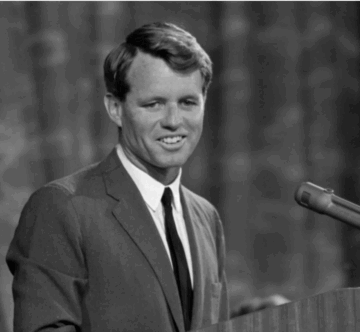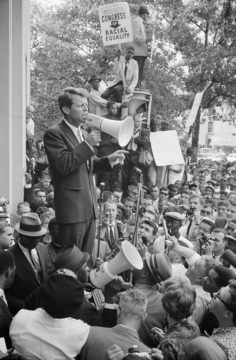by Mark Harvey

The late Robert F. Kennedy, who ran for President in 1968, could be considered a great man and even more commendably, a good man. It wasn’t always so. As a young ambitious lawyer he served under Joseph McCarthy during the hearings meant to weed out communists from American politics. Those hearings ruined many a life and are a stain on American history. He was an early supporter of the Vietnam War, perhaps our most ill-considered and violent venture overseas. In short, he was as misguided as a young man as his now seventy-one-year-old son RFK Jr is as an old man. The big difference is that the father evolved over the years from vast experience and from the terrible loss when his own brother was assassinated. He went from a cocky, overly ambitious lawyer to a compassionate man tempered by pain.
His son RFK Jr has traveled the opposite life arc. He began his career as a promising and effective environmental lawyer and in a story worthy of Greek tragedy, took on the arrogance of an Agamemnon or an Icarus. If you like the classics, you’ll recall that Agamemnon, the protagonist in a play written by Aeschylus, committed a great act of hubris. He sacrificed his own daughter Iphigenia to get favorable winds for his warships on their way to Troy.
RFK’s act of hubris is assuming he has the background and ability to manage something as massive and complicated as Health and Human Services, by far the biggest budgeted department in the US government, weighing in at $1.6 trillion. Its budget dwarfs the Department of Defense. Health and Human Services has 80,000 employees and oversees some of our most important agencies including The Center for Disease Control and Prevention (CDC), The Food and Drug Administration (FDA), and Medicare and Medicaid Services.
In many ways choosing that secretary should a be a president’s most important decision. The effectiveness of the CDC alone may well determine whether the next pandemic is stopped in its tracks or kills millions of people. The FDA works hand-in-hand with the CDC in determining which vaccines can and can’t be released, which medicines are ready for market, and how to keep our food supply safe. In other words, the person in charge of all this should be very good at managing money, tens of thousands of people from diverse professions, and have either a strong science background or at least the humility to defer to those who do. Read more »

